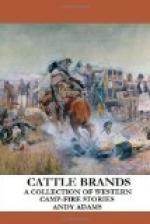Edwards close-herded the black-eyed girl till supper time. Not a one of us got a dance with her even. Mouse admitted next day, as we rode home, that he squeezed her hand several times in the grand right and left, just to show her that she had other admirers, that she needn’t throw herself away on any one fellow, but it was no go. After supper Billy corralled her in a corner, she seeming willing, and stuck to her until her brother took her home nigh daylight.
Jack got us boys pardners for every dance. He proved himself clean strain that night, the whitest little Injun on the reservation. We knocked off dancing about midnight and had supper,—good coffee with no end of way-up fine chuck. We ate as we danced, heartily. Supper over, the dance went on full blast. About two o’clock in the morning, the wire edge was well worn off the revelers, and they showed signs of weariness. Miller, noticing it, ordered the Indian war-dance as given by the Cheyennes. That aroused every one and filled the sets instantly. The fiddlers caught the inspiration and struck into “Sift the Meal and save the Bran.” In every grand right and left, we ki-yied as we had witnessed Lo in the dance on festive occasions. At the end of every change, we gave a war-whoop, some of the girls joining in, that would have put to shame any son of the Cheyennes.
It was daybreak when the dance ended and the guests departed. Though we had brought our blankets with us, no one thought of sleeping. Our cook and one of the girls got breakfast. The bride offered to help, but we wouldn’t let her turn her hand. At breakfast we discussed the incidents of the night previous, and we all felt that we had done the occasion justice.
XIII
A QUESTION OF POSSESSION
Along in the 80’s there occurred a question of possession in regard to a brand of horses, numbering nearly two hundred head. Courts had figured in former matters, but at this time they were not appealed to, owing to the circumstances. This incident occurred on leased Indian lands unprovided with civil courts,—in a judicial sense, “No-Man’s-Land.” At this time it seemed that might graced the woolsack, while on one side Judge Colt cited his authority, only to be reversed by Judge Parker, breech-loader, short-barreled, a full-choke ten bore. The clash of opinions between these two eminent western authorities was short, determined, and to the point.
A man named Gray had settled in one of the northwest counties in Texas while it was yet the frontier, and by industry and economy of himself and family had established a comfortable home. As a ranchman he had raised the brand of horses in question. The history of this man is somewhat obscured before his coming to Texas. But it was known and admitted that he was a bankrupt, on account of surety debts which he was compelled to pay for friends in his former home in Kentucky. Many a good man had made similar mistakes before him. His neighbors spoke well of him in Texas, and he was looked upon as a good citizen in general.




